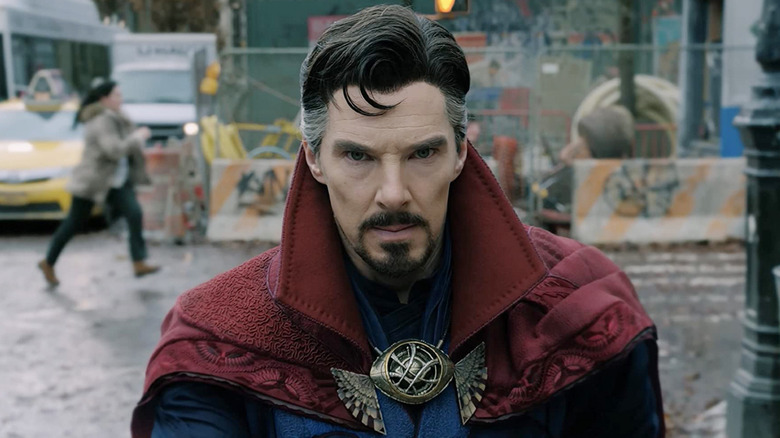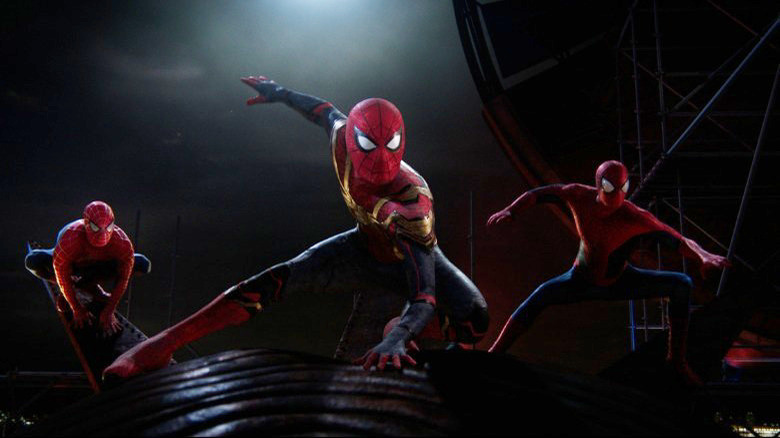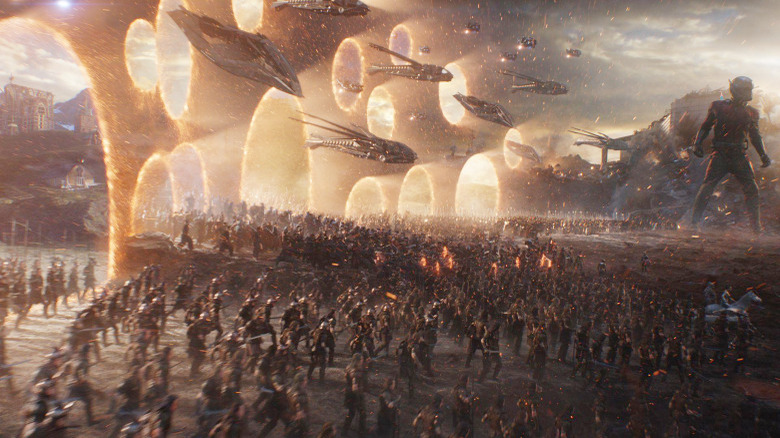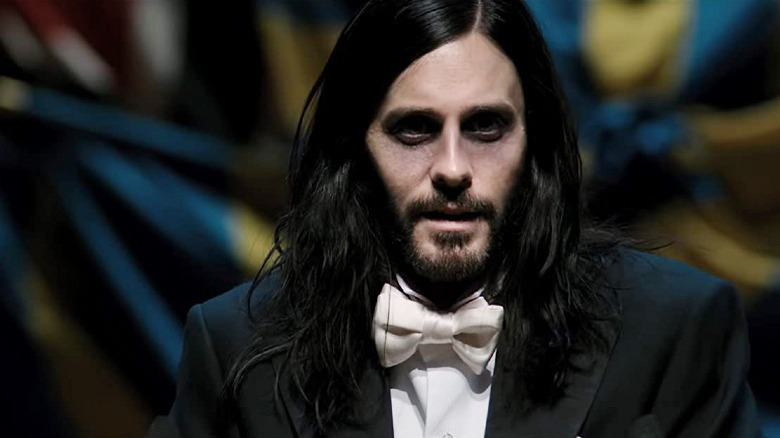How Marvel Studios Leveraged Spoiler Culture
At the time of writing this, Marvel Studios has only just released the teaser trailer for "Thor: Love & Thunder." It's a promo that's big on vibes, from the use of Guns N' Roses' "Sweet Child O' Mine" to the glimpses of all your Marvel Cinematic Universe faves (Thor! Valkyrie! The Guardians of the Galaxy!) to a small taste of what's to come (Natalie Portman and her gasp-worthy arms as the Mighty Thor). But at the same time, it almost goes out of its way to avoid explaining what the film is about. In fact, most of the footage only seems to come from the movie's first 15-20 minutes, given the Guardians will likely play a small role, and there's nary a glimpse of Christian Bale as the main antagonist: Gorr the God Butcher.
On the one hand, there's nothing, per se, wrong with this approach. It's a teaser, so all it needs to do is "tease," right? However, this is what Marvel Studios does with every piece of marketing now. We've gotten multiple full-length trailers, TV spots, and promo clips for "Doctor Strange in the Multiverse of Madness," and yet we're still no closer to knowing what the film is actually about, much less who the central villain is (is it Baron Mordo or an Evil Doctor Strange?). It's a testament to the studio's successful leveraging of spoiler culture that it's been able to do this while avoiding any sort of major backlash. If anything, Marvel has trained its fans to expect no less.
(*In Ben Wyatt voice*) It's all about the spoilers
As /Film's BJ Colangelo noted in her great piece about movie spoilers, spoiler culture in cinema is nothing new. The marketing for Alfred Hitchcock's 1960 thriller "Psycho" famously featured taglines asking moviegoers not to spoil the film's ending, cheekily adding, "It's the only one we have." Hitchcock even went so far as to buy as many copies of Robert Bloch's source novel as possible in a bid to keep the movie's famous twist under-wraps. Amusingly, I went in knowing exactly what to expect, having been inspired to watch the film shortly after borrowing Bloch's book from a library when I was 12 years old. (Somewhere, no doubt, old Hitch is shaking his head in disapproval.)
While the "Psycho" marketing was supposedly a means to protect the movie's artistic integrity, it was also terribly effective at spurring people to see the film as soon as possible, lest they be spoiled ahead of time. All Marvel Studios has done is take the next step from there, turning the big reveals for its movies into the primary factor motivating you to watch them right away. Think about how much of the pre-release hype for "Spider-Man: No Way Home" (a Sony Pictures film, granted, but part of the MCU) centered on Andrew Garfield and Charlie Cox denying they would appear in the movie, or Tom Holland doing the same on Tobey Maguire's behalf. Indeed, prior to its arrival, the "No Way Home" discourse was much more focused on the idea of Daredevil and a trio of Spider-Men showing up, and not what makes the film a worthy "Spider-Man" adventure.
The unspoken implication was clear: If you want to know for certain and avoid having your experience "ruined," you'll just have to rush out and see "No Way Home" on opening day or shortly after.
How spoiler culture has affected the film industry
The more Marvel Studios has used this strategy (making spoilers the main attraction for its movies), the more fixated its fans have become on avoiding anything and everything that could constitute a spoiler going in. This creates a positive feedback loop where the less MCU movie trailers give away in advance, the better they go over with people anxious about being spoiled. In turn, these same people are even more inspired to hurry out and see them. One need look no further than the franchise's many, many massive box office opening weekends for proof of this.
Hollywood's greater preoccupation with opening weekends didn't begin with the MCU, but it's certainly pushed the industry further in that direction. Studios take a higher percentage of opening weekend returns than they do ticket sales in later weeks, so there's a clear financial incentive there. It's why studios were so eager to use the pandemic to push for a "new normal" 45-day theatrical window instead of the old 90-day standard. The longer a film plays in theaters, the less valuable it is to them, especially when they could be using it to bolster their streaming services instead. Theater chains, however, take a higher percentage of ticket sales later into a movie's theatrical run, which is the reason they're so unhappy about the shrinking release window. This has also sped up the demise of indie theater chains that used to get by on showing films at a reduced ticket price at a later point in their runs, which they could do because they were keeping more of the revenue for themselves.
What happens when the spoilers don't live up to the hype?
Marvel Studios' success has affected the industry in other ways, too, not least of which is the surge in popularity of post-credits scenes. These "stingers," as they're also known, are the crown jewels of the MCU and are kept secret above all else, with some of them not even screening for critics. It's gotten to the point where nearly every tentpole has them, be they a superhero movie or the latest "Fast & Furious" entry. For the most part, they follow the MCU formula of either teasing events in sequels or spinoffs to come or, in some cases, introducing a new character ahead of their expanded role in the next film (or sometimes even a returning character). Then there are the exceptions that mock this trend with a post-credits gag, as the MCU itself has also done on occasion.
While this can and often does serve to start building hype for what's to come, it's also a double-edged sword. Much like ending your film on a cliffhanger, you risk including a post-credits scene teasing a sequel, only for your movie to bomb and leave the franchise dead in the water. Of late, though, it feels like the bigger issue with a lot of credits stingers is they merely fall flat and fail to please audiences who are now trained to expect something mind-blowing. This was only just the case with "Eternals" and "Spider-Man: No Way Home," both of which featured either newcomers (Harry Styles as Thanos' brother Eros) or familiar faces (Eddie Brock and Venom, or rather Venom's voice) in post-credits scenes that came and went with little fanfare. And the less said about those confusing credits stingers in "Morbius," the better.
Far be it from me to suggest Marvel Studios' leveraging of spoiler culture will come back to haunt it, especially on the heels of "No Way Home" and its record-breaking run at the box office. That said, the studio's emphasis on spoiler avoidance puts all the more pressure on its movies to deliver plot twists, character reveals, and post-credits scenes that justify the hype, or else they risk pushing moviegoers away more than drawing them in. And should it ever reach that point, who knows what the rest of Hollywood will do next, having spent so many years chasing the MCU's shadow.
"Doctor Strange in the Multiverse of Madness" opens in theaters on May 6, 2022.



